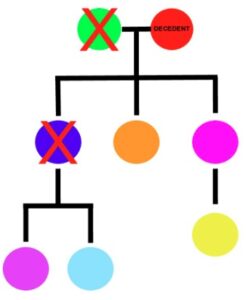What will happen in the Probate process if I do not have estate planning?
In Illinois, the Probate process starts with the filing of a petition. If a person passed away without a will, the petition is called a Petition for Letters of Administration. This document will include the amount of both real and personal property held by the decedent, as well as any annual rental income that can be expected to be paid to the estate.
In addition to the Petition for Letters of Administration courts require potential administrators to file an affidavit of heirship, pay for bond insurance equal to 1.5 times the total personal property in the estate, and file with the court Declinations of Office and Waivers of Notice for every heir to the estate, even before you see the inside of a courtroom.
How do I know who is an heir?
For some families, it is easy to determine who is an heir, and for others, not so much. Illinois law first looks to any potential spouse, then to children. If no spouse or children exist, then the Court will consider parents, then siblings, then nieces or nephews. If no heir is found, the courts will continue to go “up and out” meaning parents, then grandparents, aunts and uncles, and even cousins. The infographic below may serve to clarify confusion associated with the complexities of determining who may take in an intestate estate.
I know who the heirs are, but there are so many! What do I do?
Some estates are more complex than they seem. One case we have seen started with only six known heirs, and ballooned to fifteen before the estate could be opened.
So how does this happen, and how can you avoid it?
In our case, the decedent was the sister of the six heirs, but had two other siblings that had already passed away. The two siblings that had passed away had several children, who had a legal claim to the property in the estate. The only way to avoid this happening is to properly execute estate planning documents.
Now that I know who is an heir, how do I determine what to give them?
Illinois is a Per Stirpes state, different from a per Capita state, which would mandate property be distributed differently. Per Stirpes property distribution goes like this:
Look at the graph below. Presume that the red circle recently died, and we must now determine who the heirs are. Per Stirpes would mandate that we first look to the spouse, green, who in this case is marked with a red X to indicate that they have passed away. We then must look to the children, Blue, Orange, and Pink as the heirs to the estate.

But we cannot stop there, because Blue is dead too, so how do we account for that? Illinois Per Stirpes law mandates that the estate be divided into the original 1/3 amounts, and given to Orange and Pink. The 1/3 left that was meant for Blue then gets divided between Purple and Light blue.
In the case here, the only person that would not be able to receive a portion of the Red estate, is Yellow. Yellow cannot take, because their parent, Pink, blocks them from doing so. It is presumed that when Pink passes away, Yellow would then take the 1/3 portion.
As you can likely imagine, as families become more complex, so do estates. It can get particularly difficult when there is a rift in the family that results in family members ceasing contact. When this happens, it is nearly impossible to properly distribute estate property, and causes quite the headache for lawyers and loved ones alike. The only way to avoid headaches like these is to be proactive, and properly execute estate planning documents.
Now I know who is an heir and what they should receive, what do I do about the house?
The short answer is that you are likely going to be forced to sell it. Probate Courts rarely take into consideration the emotional ties to real estate, and consistently value equitable distribution over all else. Unless the estate is large enough to give the house to one person, or the heirs can agree between themselves to take a lesser share of the estate to keep the home, Courts will mandate that the home be held in all heirs names (meaning they have equal power to force a sale if they want the equity) or to sell the home and distribute the funds accordingly.
Each family is different, and while some can agree to terms that benefit each other, other families are left to go through the process of selling off sentimental property. Probate can be a stressful and emotional time, and facing the harsh realities of intestate laws can cause unneeded stress and mental anguish for your closest loved ones. The best way to avoid this is to be proactive, and properly execute estate planning documents.

